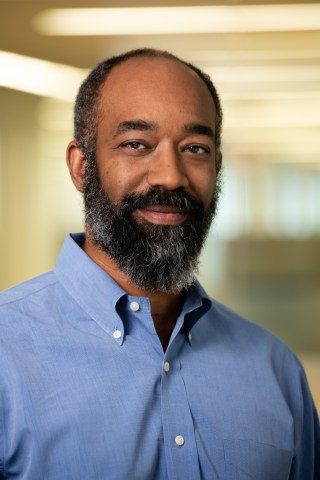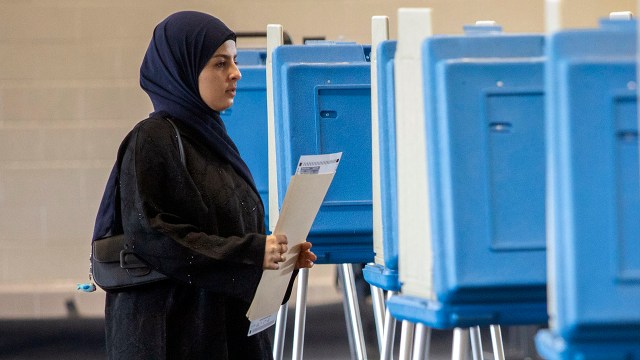
Muslims make up slightly more than 1% of the U.S. adult population. But they can have a significant political impact in areas where they are most highly concentrated.
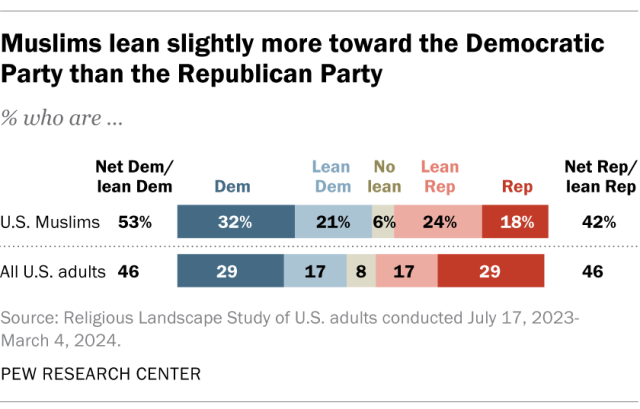
For much of the last two decades, Muslims have been far more likely to identify with or lean toward the Democratic Party than the Republican Party. But Pew Research Center’s 2023-24 Religious Landscape Study shows that the Democratic advantage has shrunk considerably. Around half of Muslim adults (53%) identify with or lean toward the Democratic Party, while 42% identity with or lean toward the Republican Party.
Many observers have attributed the shift away from the Democratic Party to Muslims’ disappointment with President Joe Biden’s handling of the war in Gaza between Israel and Hamas. In a February 2024 poll by the Center, most U.S. Muslims said Biden was favoring the Israelis too much.
However, Muslims’ political values are as diverse as their demographic characteristics. Looking at issues where there are significant partisan gaps, we find that Muslim Americans do not align consistently with either political party. On some issues, the balance of opinion among Muslims is similar to that found among Democrats. On other issues, Muslims tend to agree more with Republicans than Democrats. And on still others, they stand out from both political parties.
Related: How U.S. Muslims compare with other Americans religiously and demographically
This analysis primarily draws from the Center’s 2023-24 RLS, a nationally representative survey of 36,908 U.S. adults. It included 273 Muslim respondents; the margin of error for results based on this group is plus or minus 8.3 percentage points.
Where Muslims align more with Democrats
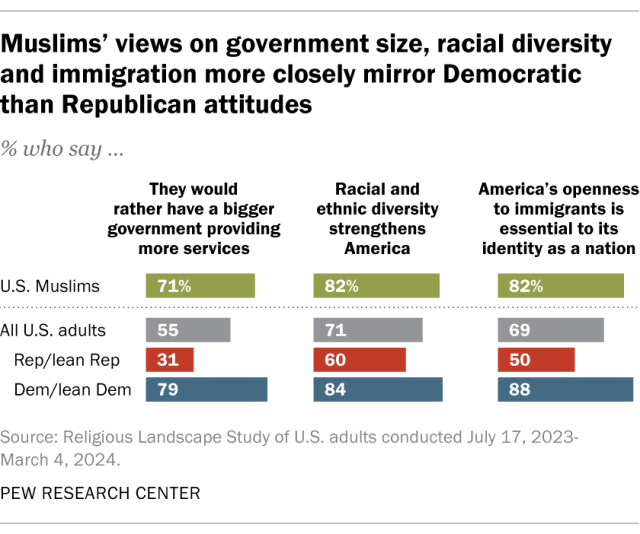
Muslims are closer to Democrats than Republicans on questions about the scope and scale of government, racial and ethnic diversity, and immigration.
When asked whether they would prefer a bigger government that provides more services or a smaller government that provides fewer services, 71% of Muslims say they prefer a bigger government. This view is held by 79% of adults who consider themselves Democrats or lean toward the Democratic Party. By comparison, only 31% of Republicans and GOP leaners prefer a bigger government that provides more services.
When it comes to immigration, 82% of Muslims say America’s openness to immigrants is essential to its identity as a nation. Roughly nine-in-ten Democrats (88%) share this opinion. Republicans, however, are evenly divided: Half say accepting immigrants is essential to America’s identity, while 48% say the nation risks losing its identity if it is too accepting of immigrants. (Previous studies have shown that support for immigration is common both among Muslims who immigrated to the United States from another country and those who were born in the U.S.)
The pattern is similar on the topic of racial and ethnic diversity. Around eight-in-ten Muslims (82%) say this type of diversity strengthens America – on par with the 84% of Democrats who say the same. A smaller majority of Republicans (66%) believe racial diversity strengthens the country.
Where Muslims align more with Republicans
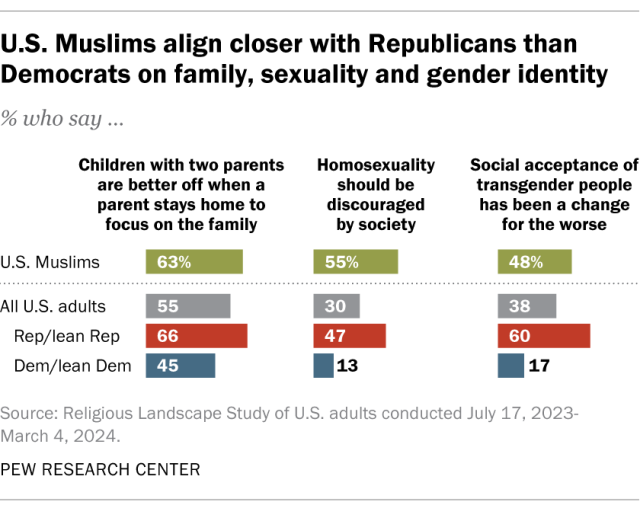
Muslims are closer to Republicans than Democrats on topics including family dynamics, sexuality and gender identity.
For example, 63% of Muslims – and 66% of Republicans – say children with two parents are better off when one parent stays home to focus on the family. Democrats are more divided on this question: 45% say children are better off with a stay-at-home parent, while 54% say they are just as well off when both parents work outside the home.
Related: Religion, fertility and child-rearing among U.S. religious groups
When it comes to sexuality, opinions are divided among both Muslim Americans and Republicans. Roughly half of U.S. Muslims (55%) and Republicans (47%) say homosexuality should be discouraged by society, while 41% of Muslims and 50% of Republicans say it should be accepted by society. Very few Democrats (13%) say homosexuality should be discouraged by society.
And when asked about societal acceptance of transgender people, Muslims are again closer to Republicans than Democrats, even as there are divisions among both Muslims and Republicans. Around half of U.S. Muslims (48%) say growing social acceptance of transgender people has been a change for the worse, while a third say it has been a change for the better.
By comparison, 60% of Republicans say acceptance of transgender people has been a change for the worse, while 19% say it has been a change for the better. The reverse is true among Democrats: 17% say it has been a change for the worse, while 61% say this has been a change for the better.
Across all three groups, roughly one-in-five say the change hasn’t made much difference.
Where Muslims are more divided than either party
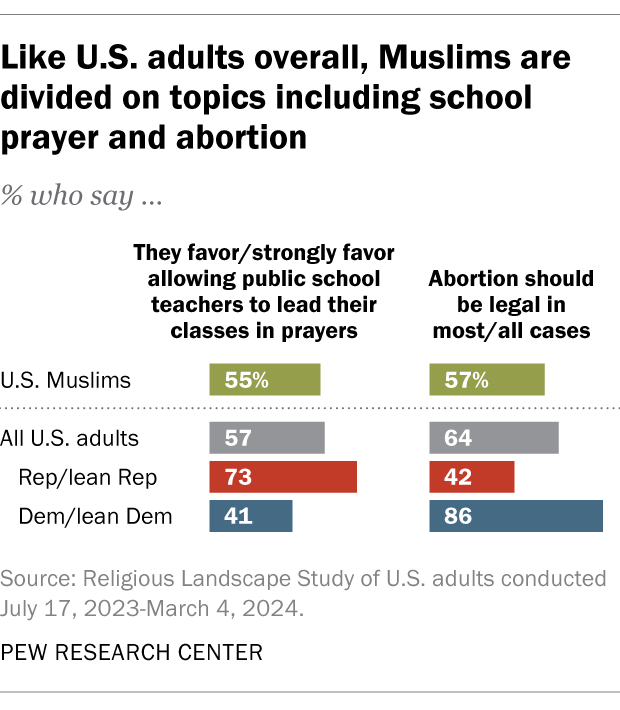
On some issues – including the proper role of religion in public life, as well as abortion – Muslims’ views are more divided than those of either Republicans or Democrats. This is similar to the pattern seen among all U.S. adults.
For example, 55% of Muslims favor allowing public school teachers to lead classroom prayers that refer to God, but not to any specific religion. This view is shared by 57% of U.S. adults overall. There are wide partisan differences on this question, however: Most Republicans (73%) are in favor of such classroom prayers, while fewer than half of Democrats (41%) agree.
When it comes to abortion, 57% of Muslims – and 64% of all adults – say it should be legal in all or most cases. But here, too, partisan divides are stark: 86% of Democrats say abortion should be legal in all or most cases, while fewer than half of Republicans (42%) say the same.
